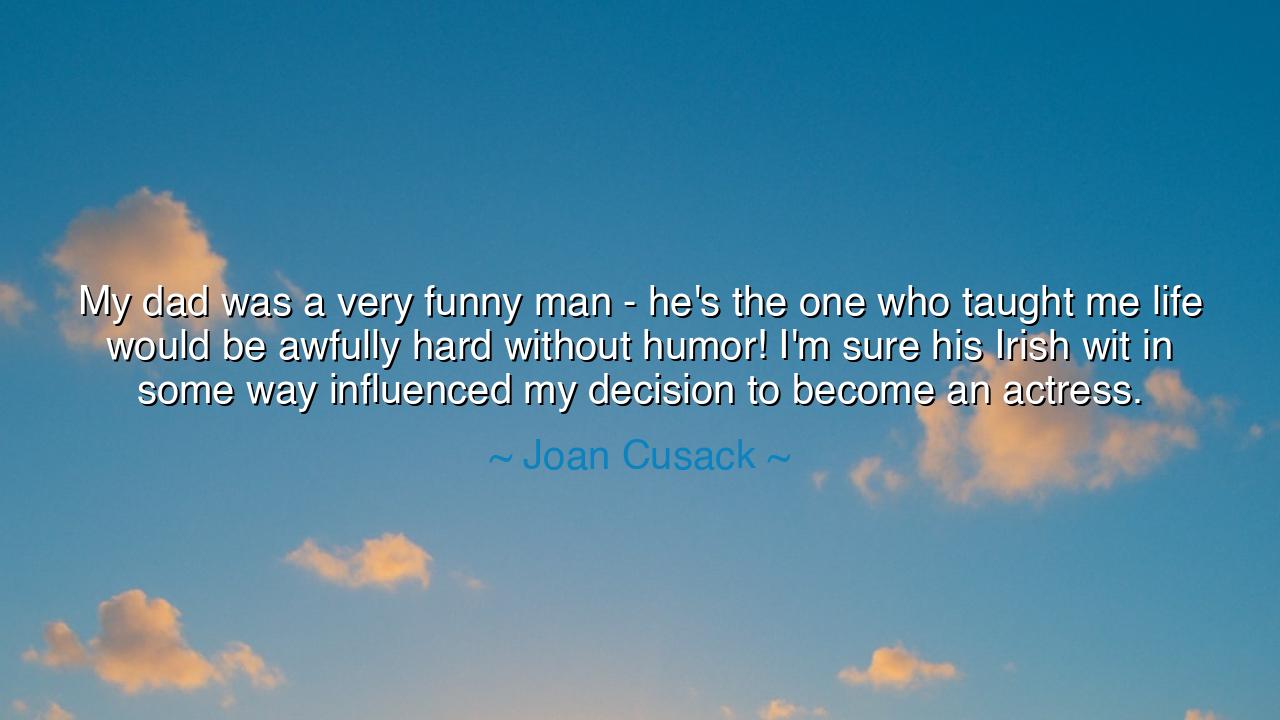
My dad was a very funny man - he's the one who taught me life
My dad was a very funny man - he's the one who taught me life would be awfully hard without humor! I'm sure his Irish wit in some way influenced my decision to become an actress.






In the rich tapestry of life, where the threads of heritage and experience weave together, there are those moments when the lessons passed down from one generation to the next shape the very essence of who we are. Joan Cusack, in her reflection on the influence of her father, speaks of the deep impact humor had on her life. "My dad was a very funny man - he's the one who taught me life would be awfully hard without humor! I'm sure his Irish wit in some way influenced my decision to become an actress." In these words, Cusack honors not only her father's wit and humor, but the transformative power of laughter itself—a power that has guided humanity through its darkest days and brightest triumphs.
From the earliest times, the ancients recognized the critical role of humor in navigating the complexities of life. The Greek philosophers, such as Aristotle, discussed the human condition with a keen understanding of emotion and reason, but they also understood that humor was an essential ingredient for both personal survival and communal connection. The philosopher Socrates, though a man of great intellectual stature, was known for his ability to engage in witty dialogues, using humor as a bridge to deeper truths. In a similar way, Cusack's father, with his Irish wit, imparted the understanding that humor could transform the mundane into something profound, and that life, no matter how challenging, was always more bearable when approached with laughter.
The Irish wit mentioned by Cusack is no ordinary humor, but a form that is both sharp and tender, capable of turning the harshest realities into something manageable. The Irish have long been recognized for their ability to endure hardship with a sense of joy that transcends the darkness around them. Consider the story of the great Irish writers, like James Joyce or Oscar Wilde, who, in the face of personal and societal struggles, used their humor not as a distraction, but as a weapon of resistance. Wilde’s wit, for example, was not merely for entertainment—it was a tool of social critique, a way to speak truth to power while maintaining a lightness of spirit. In this tradition, Cusack’s father imparted not just jokes or laughter, but a wisdom—that life, even in its most difficult moments, could be lightened by the joy of humor.
Through the example set by her father, Cusack learned that humor was not just a way to entertain, but a vital force that could shape one's outlook on life. It is said that the greatest actors are those who understand the balance of light and dark, who can find the truth in the absurd and the depth in the seemingly trivial. Acting, at its best, is not just about portraying characters, but about embodying the human experience in its entirety—the joys, the sorrows, and the laughs that make us who we are. Just as her father’s humor influenced her, Cusack learned to take that same wit and playfulness and use it in her craft. It was not the absence of seriousness, but the ability to laugh through it that made her work so compelling.
Consider the legendary actors of ancient Greece, who performed in the great theaters of Athens. Among the tragedies and comedies that filled these spaces, the most enduring works were those that balanced the serious and the lighthearted, the tragic and the comic. The plays of Sophocles and Aristophanes were not simply about entertainment—they were a reflection of the human condition, filled with both mirth and sorrow. In these works, the actors were called upon to embody not just the struggles of their characters, but the larger truth of life itself: that humor, when wielded wisely, could bring clarity in times of darkness, and that laughter was a vital part of human resilience.
The lesson from Cusack’s words is clear: humor, especially the kind that arises from wit and joy, is a vital part of the human experience. It can help us endure even the most difficult challenges and transform the heavy burdens of life into something lighter and more manageable. Humor is not a diversion from the struggles we face, but a tool for navigating them. And in this world that often demands seriousness and intensity, it is humor that allows us to maintain our humanity and our connection with one another. Just as Cusack learned from her father, we too must find the joy in laughter, the wisdom in humor, and the strength that comes from not taking ourselves too seriously.
So let us, like Joan Cusack, embrace the lessons passed down through the generations, recognizing that humor is not a weakness but a strength—a force that can help us endure life’s hardships and connect more deeply with others. Let us also celebrate the wisdom of our own families, those who have imparted to us their unique gifts, whether it be a sense of tenacity, a sense of humor, or a passion for life. In doing so, we will find that the journey, though difficult at times, is made bearable and even joyful by the laughter and lightness we bring into it. For, in the end, humor is not just about escaping the world’s troubles—it is about finding the strength to face them head-on, with joy, resilience, and grace.






AAdministratorAdministrator
Welcome, honored guests. Please leave a comment, we will respond soon